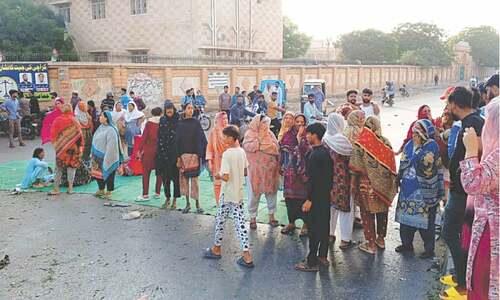KARACHI: The Sindh police on Tuesday reached an ‘understanding’ with the mobile phone service providers to access call data record and location of their subscribers through global system for mobile communication (GSM) as well as geo-fencing facility — the technology that was not allowed to the police by the federal interior ministry — for investigation purpose, officials and sources said.
They said the police authorities and top officials of Mobilink, Ufone, Telenor, Warid and Zong reached the ‘understanding’ at a meeting presided over by Sindh IG police Ghulam Hyder Jamali, held at the Central Police Office (CPO). Senior officials of the Pakistan Telecommunication Authority (PTA) were also present.
Take a look: Anti-terrorism force to get cellphone tracking devices
According to a brief police statement issued following the meeting, the officials discussed in detail the procedure to ensure timely access to information such as call data record and location besides the geo-fencing facility. “It was decided to appoint focal persons for all police units to remove bottlenecks in this regard to ensure smooth flow of information and timely action against terrorists and criminal elements.”
“A list of focal persons for each unit of police department will be finalised and communicated to the PTA within 24 hours. The IG directed the DIG headquarters to do the needful in this regard,” added the CPO statement.
Access to call record data and location of subscribers for police investigation purpose has been a long-standing demand of the law-enforcement agency. In 2008, the mobile phone companies and the PTA refused to allow such privilege to the police, insisting that they could share the facility with the intelligence agencies only.
Read more: Surveillance in Pakistan exceeds legal capacity: report
The police authorities only a couple of years ago managed to get approval of power corridors in Islamabad to access call data record and acquire information about subscribers’ location. Geo-fencing, however, still remains an exclusive privilege of the spy agencies as the police needed a nod from the interior ministry or assistance from the powerful intelligence apparatus for that purpose.
According to the CPO statement, the meeting decided to immediately take up the issue of information regarding geo-fencing with the ministry of interior to remove any kind of ambiguity. “The Sindh IG directed DIG headquarters to draft a letter for the ministry of interior on justified and logical grounds and also asked the PTA to approach the interior ministry in the light of a discussion and decisions taken in the meeting.”
When a senior official was asked about the legality and mechanism of getting geo-fencing facility from the mobile phone companies after it was denied to the police by the interior ministry, he said it was just ‘an understanding’ between the law-enforcement agency and mobile phone companies ‘for the time being’.
“Geo-fencing in a security strategy model, provides security to wireless local area networks,” said the official. “It’s a modern technology being used by the investigators across the world and that could only be done through cellular companies’ assistance. We only engage cellular companies in high-profile cases. Interior ministry has not yet allowed it but the police are now going to implement it through understanding with the companies. As far as a formal nod is concerned, we are also in touch with the interior ministry to resolve the issue for once and all.”
Read more: Hacking Team hacked: The Pakistan connection, and India's expansion plan
Published in Dawn, July 29th, 2015
On a mobile phone? Get the Dawn Mobile App: Apple Store | Google Play















































